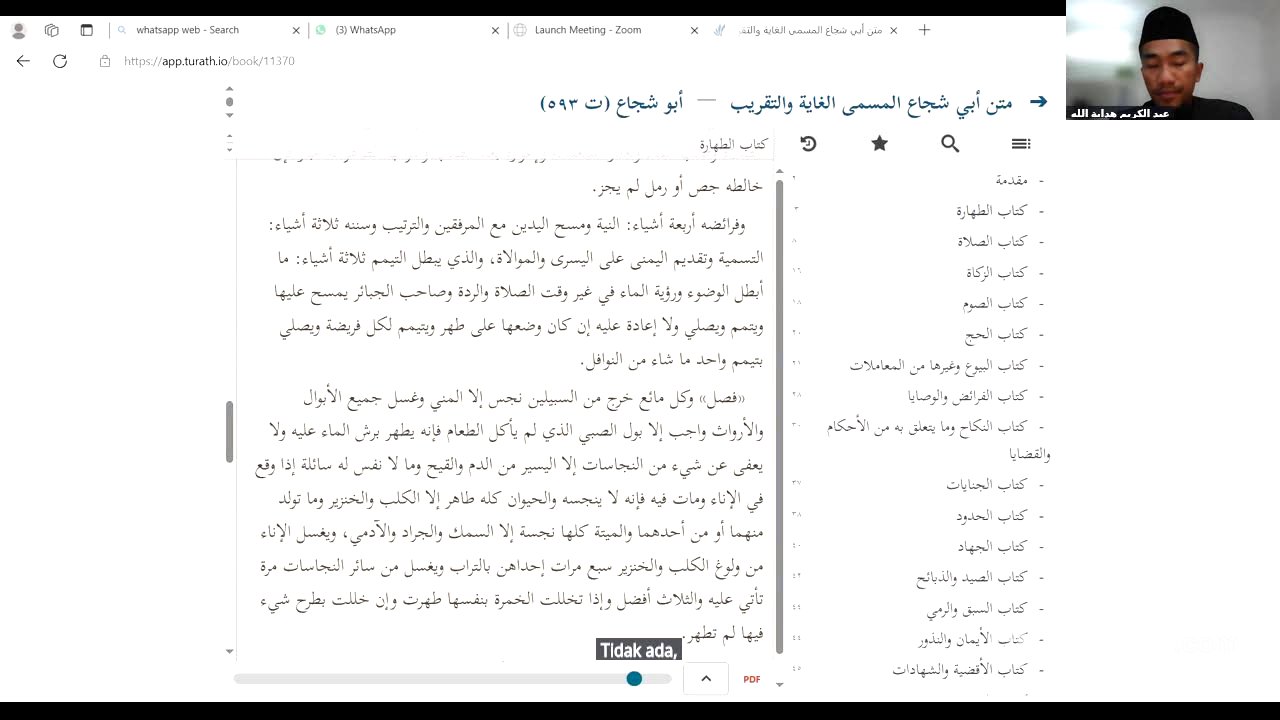TLDR;
This video provides a detailed explanation of Tayammum (dry ablution) according to Islamic law, specifically within the Shafi'i school of thought. It covers the definition, conditions, pillars, and Sunnah acts of Tayammum, as well as what invalidates it. Additionally, it addresses specific scenarios such as performing Tayammum while traveling, being ill, or having injuries covered with bandages or casts.
- Tayammum is a substitute for ablution (wudu) and bathing (ghusl) when water is not available or its use is harmful.
- There are five conditions that must be met for Tayammum to be valid.
- The pillars of Tayammum include intention (niyah), wiping the face, and wiping the hands up to the elbows.
- Certain actions invalidate Tayammum, such as actions that invalidate wudu, finding water before starting prayer, and apostasy.
- Specific rules apply to individuals with injuries covered by bandages or casts, including how to perform ablution and whether prayers need to be repeated.
Introduction [0:49]
The video begins with an introduction and prayer, setting the stage for a lesson on Islamic jurisprudence (fiqh), specifically focusing on the topic of Tayammum (dry ablution) as detailed in Matan Abu Syuja'. The lesson aims to provide practical knowledge about permissible and impermissible actions in daily life, particularly concerning worship and purification.
Definition of Tayammum [2:32]
Tayammum is defined as "alqasdu" in Arabic, meaning "the aim" or "the intention". According to Islamic law, Tayammum is "isolu alajada eh badalan minal minal wudu," which means using clean earth to wipe the face and hands up to the elbows as a substitute for ablution (wudu) or bathing (ghusl). Tayammum is a form of purification (taharah), but it is a substitute, not a basic form of purification.
Conditions for Tayammum [4:05]
There are five conditions that must be met for Tayammum to be permissible as a substitute for ablution or bathing:
- Existence of a valid excuse (Wujudul Uzri): This includes not having access to water due to travel or illness.
- Travel: If a person is traveling and cannot find water, they are permitted to perform Tayammum.
- Illness: If a person is ill and using water would worsen their condition or delay recovery, they are allowed to perform Tayammum. Illnesses include those that endanger life, body parts, or cause severe pain.
- Arrival of prayer time (Wadukulu Waka Shah): Tayammum can only be performed after the time for prayer has begun. This is based on the interpretation of Quranic verses related to ablution.
- Searching for water (Watabul Ma): A person must make an effort to find water before resorting to Tayammum. The extent of the search depends on the situation.
- If one is sure there is no water, no search is needed.
- If there is a possibility of water, a search is required.
- If one is sure there is water nearby, the search should extend as far as people typically go to collect firewood.
- Inability to use water (Wat taadur ismalihi): This refers to situations where water is available but cannot be used due to legal or practical reasons, such as illness or the presence of dangerous animals near the water source.
- Using pure, dusty soil (lam lam yujizi): The soil used for Tayammum must be clean and have dust on it. It cannot be mixed with other materials like cement or sand.
Conditions for Travelers [8:18]
For travelers, several conditions determine when Tayammum is permissible:
- If a traveler is certain that there is no water available, they can perform Tayammum without searching.
- If a traveler believes there is a possibility of finding water, they must search for it.
- If a traveler is sure that water is available nearby, they must search for it within a reasonable distance. If the water is too far and searching for it would cause them to miss the prayer time, they can perform Tayammum.
Conditions for Sick People [11:57]
A sick person is allowed to perform Tayammum under specific conditions:
- The illness endangers their life.
- The illness endangers their body parts.
- The illness damages their body parts.
- Using water causes severe pain.
- Using water will worsen the illness or delay healing.
Timing of Tayammum [15:23]
Tayammum must be performed after the prayer time has begun. This is based on the Quranic verses that discuss the obligations of ablution. The original law for both wudu and tayammum is that they should be performed after entering prayer time. However, wudu is an exception because the Prophet Muhammad (peace be upon him) performed ablution before prayer time.
Searching for Water [18:59]
The condition of searching for water is based on the Quranic verse "falam tajidu maan fatayamamu," which means "and if you do not find water, then do Tayammum." A person is considered to have not found water if they have searched for it.
Distance for Searching Water [20:26]
The distance one must travel to search for water depends on the circumstances. If there is a possibility of finding water, the search should extend as far as an arrow shot or as far as one's voice can be heard when shouting to their caravan.
Excuse for Using Water [22:04]
Having an excuse for not using water means that there is no water legally available. This includes situations where water exists but cannot be used due to illness or danger.
Using Dusty Soil [24:27]
The soil used for Tayammum must be pure and have dust on it. This is according to the Shafi'i school of thought. Using soil that is not dusty or dust from walls or chairs is not valid.
Pillars of Tayammum [27:46]
There are four pillars of Tayammum:
- Intention (Aniah): The intention for Tayammum is to allow prayer (istibahatu asalah), not to remove hadas (impurity).
- Wiping the face (mashul face): The entire face must be wiped with the dusty soil.
- Wiping the hands up to the elbows: Both hands must be wiped up to the elbows.
- Order (Tartib): The steps must be performed in the correct order: intention, wiping the face, and wiping the hands.
Sunnah Acts of Tayammum [32:41]
There are three Sunnah acts in Tayammum:
- Saying "Bismillah" (In the name of Allah).
- Starting with the right hand.
- Performing the actions continuously without interruption (almalah).
Invalidating Factors of Tayammum [33:12]
Three things invalidate Tayammum:
- Anything that invalidates wudu, such as defecating, urinating, passing wind, skin contact between non-mahram men and women, sleeping in an uncomfortable state, losing consciousness, and touching the genitals.
- Finding water before starting prayer. If a person performs Tayammum and then finds water before beginning the prayer, their Tayammum is invalidated. However, if they find water while in the middle of prayer, their Tayammum and prayer remain valid, with an exception.
- Apostasy (arriddah).
Exceptions for Finding Water During Prayer [35:52]
If a person finds water while praying, their prayer remains valid, except if they are in a residential area where water is generally available but temporarily unavailable (e.g., due to water outage). In this case, they must repeat the prayer.
People with Bandages or Casts (Sahibul Jabair) [38:28]
The video addresses the procedures for performing ablution and Tayammum for people with injuries covered by bandages, casts, or wound dressings.
- Unbandaged Wounds: If a wound is not covered, the person should perform ablution and Tayammum.
- Banded Wounds: If a wound is covered, the person should perform ablution as usual, wipe the bandage with water, perform Tayammum, and then continue the ablution.
Repeating Prayers for People with Bandages or Casts [47:06]
Whether a person with a bandage or cast needs to repeat their prayers depends on the following conditions:
- The bandage or cast only covers the wound or the necessary area to strengthen the bond.
- The bandage or cast was applied in a state of purity.
- The wound and bandage are not on the members of Tayammum (face and hands).
If all three conditions are met, the prayer does not need to be repeated. Otherwise, the prayer must be repeated.
Questions and Answers [52:34]
The video concludes with a Q&A session, addressing various questions from the audience regarding Tayammum, including:
- Whether Tayammum is permissible for Sunnah prayers.
- When to repeat prayers when conditions for Tayammum are not met.
- The validity of Tayammum performed in a hospital setting with limited access to proper soil.
- Recommendations for hospitals to provide dusty soil for patients who cannot perform ablution.
- The permissibility of performing ablution and Tayammum on an airplane.
- The ruling on prayers performed while unconscious.








